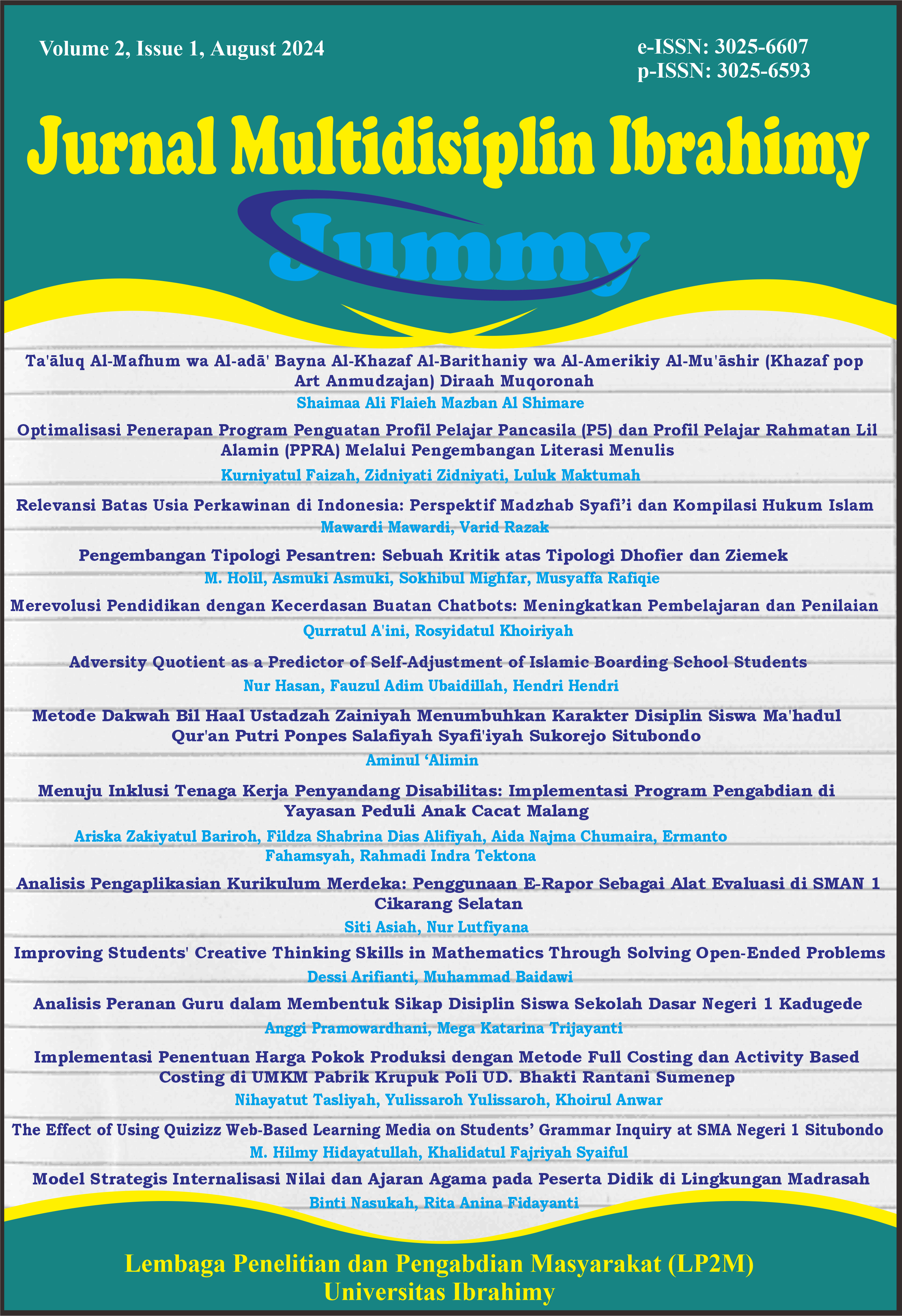Pengembangan Tipologi Pesantren: Sebuah Kritik atas Tipologi Dhofier dan Ziemek
DOI:
https://doi.org/10.35316/jummy.v2i1.5428Keywords:
Tipologi, Pesantren, Dhofier, ZiemekAbstract
The development of Islamic boarding schools is inevitable. Facts show that Islamic boarding schools have developed over time. The development referred to in this context is the development of the institutions within them. From what was initially only a kiai and a mosque, it continued to develop until there was a higher education institution. Throughout the history of the development of Islamic boarding schools, only two serious works have been found that map Islamic boarding schools into several types. The two figures are Zamakhsyari Dhofier and Manfred Ziemek. They have different opinions about the typology of Islamic boarding schools. The first mentions four typologies, while the second mentions five typologies of Islamic boarding schools. Ziemek seems to be dissatisfied with the typology of Islamic boarding schools proposed by Dhofier, so he developed it into five. This article was written in order to further develop the typology of Islamic boarding schools that they did. The development of this Islamic boarding school typology was carried out through a literature study by conducting a manuscript analysis, namely a comparison between one literature and another literature to support and reject the arguments built by the two figures. Through this literature analysis, it can be concluded that the typology of Islamic boarding schools can be developed into six types, namely types A-D remain, while the school and college indicators in Ziemek's type E version are separated, namely the college indicator is removed from type E and lowered to type F.
References
A. Khoirul Anam. (2009). Mengintegrasikan Pesantren dalam Sistem Pendidikan Nasional. NU Online. https://nu.or.id/opini/mengintegrasikan-pesantren-dalam-sistem-pendidikan-nasional-rCumF
Adi Fadli. (2012). Pesantren: Sejarah dan Perkembangannya. El-Hikam: Jurnal Pendidikan Dan Kajian Keislaman, 5(1), 35. https://ejournal.kopertais4.or.id/sasambo/index.php/elhikam/article/view/1430
Akhmad Irwan Bakhrudin. (2024). Modernisasi Pendidikan Pesantren di Pondok Pesantren Sunan Drajat Lamongan. Jes (Journal Education and Supervision), 1(2), 92–102. https://ejournal.insud.ac.id/index.php/Jes/article/view/1006
Baiturrahman. (2019). Perkembangan Pesantren dari Masjid Hingga Ma’had Aly. An-Nahdlah, 5(2), 16–37. http://journal.stitjembrana.ac.id/index.php/An-Nahdlah/article/view/11
Dhofier, Z. (1982). Tradisi Pesantren. LP3ES.
Hamlan Hi. AB. Andi Malla. (2010). Madrasah dalam Sistem Pendidikan Nasional. INSPIRASI, 1(10), 165–174. https://media.neliti.com/media/publications/242981-madrasah-dalam-sistem-pendidikan-nasiona-9e7ddb71.pdf
Hanun Asrohah. (1999). Sejarah Pendidikan Islam. Logos.
Isbir, M. (2017). Studi tentang Madrasah Nizhamiyah. Tasyri’, 24(1), 48–58. https://ejournal.kopertais4.or.id/pantura/index.php/tasyri/article/view/3174
Manfred Ziemek. (1986). Pesantren dalam Perubahan Sosial. P3M.
Marwan Saridjo. (2010). Pendidikan Islam dari Masa ke Masa: Tinjauan Kebijakan terhadap Pendidikan Islam di Indonesia. Yayasan Ngali Aksara.
Marwan Saridjo, et. a. (1982). Sejarah Pondok Pesantren di Indonesia. Dharma Bhakti.
Muh. Asroruddin al Jumhuri. (2016). Modernisasi Pendidikan Pesantren (Studi Analisis di Pondok Pesantren Nurul Haramain NW Narmada). Al-Amin: Kajian Pendidikan Dan Sosial Kemasyarakatan, 1(2), 159–172. https://ejournal.kopertais4.or.id/sasambo/index.php/alamin/article/view/3911/2799
Munirul Abidin. (2012). Model Integrasi Pesantren dan Perguruan Tinggi. Journal of Islamic Education Policy, 2(2), 79–93.
Nur Syarifuddin. (2017). Madrasah sebagai Bentuk Transformasi Pendidikan Islam Indonesia. Al-Ibrah, 2(2), 25–54. https://ejournal.stital.ac.id/index.php/alibrah/article/view/29
Rufaidah Salam. (2021). Pendididkan di Pesantren dan Madrasah. IQRA: Jurnal Pendidikan Agama Islam, 1(1), 1–9. https://journal.unismuh.ac.id/index.php/iqra/article/viewFile/5712/3729
Saifuddin Zuhri. (1979). Sejarah Kebangkitan Islam dan Perkembangannya di Indonesia. al-Ma’arif.
Sunyoto, A. (1990). Ajaran Tasawuf dan Pembinaan Sikap Hidup Santri Pesantren Nurul Haq Surabaya: Studi Kasus. IAIN Malang.
Tim Redaksi. (n.d.). Sejarah Uia Perjalanan Universitas Islam As-Syafi’iyah. https://uia.ac.id/sejarah-uia/
Yuni Rahmawati, dkk. (2024). Sejarah Pembaharuan Islam Indonesia di Era Modern: Purifikasi dan Modernisasi. Reader Repository Unimus. http://reader.repository.unimus.ac.id/index.php/display/file/299/1/0
Downloads
Published
How to Cite
Issue
Section
License












_by_Matematohir.jpg)


